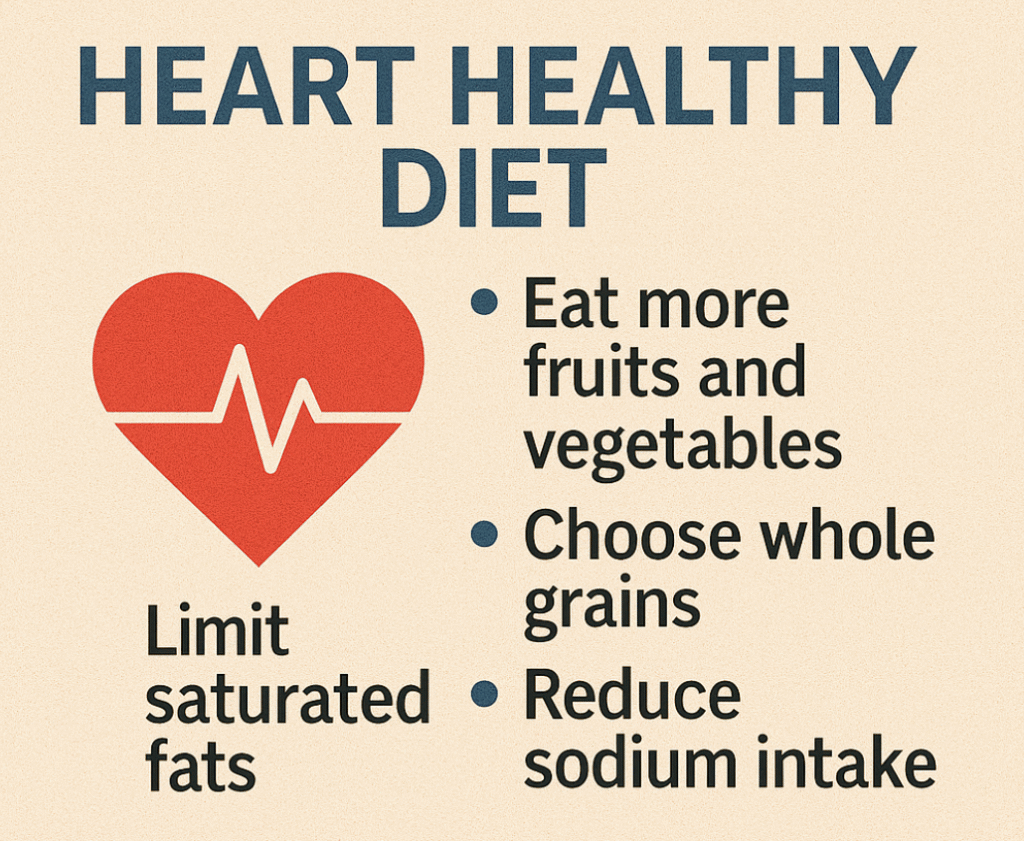Heart disease remains one of the leading causes of death worldwide, but research consistently shows that lifestyle—especially diet—plays a powerful role in prevention. Adopting a heart-healthy diet not only lowers the risk of cardiovascular disease but also improves energy, mental clarity, and overall quality of life.
Why Diet Matters for Heart Health
The foods we consume directly affect cholesterol, blood pressure, blood sugar, and inflammation—all critical factors in cardiovascular health. A poor diet high in saturated fats, sodium, and processed foods increases the risk of atherosclerosis (plaque buildup in arteries) and high blood pressure, while nutrient-rich diets can strengthen the heart and circulatory system.
Key Components of a Heart-Healthy Diet
- Fruits and Vegetables
Rich in vitamins, minerals, antioxidants, and dietary fiber, fruits and vegetables reduce oxidative stress and inflammation. The American Heart Association recommends filling at least half your plate with plant-based foods (source). - Whole Grains
Foods such as oats, brown rice, barley, and whole-wheat bread are high in fiber, which helps lower cholesterol and improve blood sugar control. Studies show that three servings of whole grains daily can significantly reduce the risk of cardiovascular disease. - Healthy Fats
Not all fats are created equal. Monounsaturated and polyunsaturated fats found in avocados, olive oil, nuts, and fatty fish (like salmon) support heart health by improving cholesterol profiles and reducing inflammation. - Reduced Sodium Intake
High sodium consumption is linked to elevated blood pressure, a major risk factor for heart disease. Limiting processed foods and avoiding excessive salt in cooking can significantly reduce cardiovascular strain. - Lean Protein Sources
Plant-based proteins such as beans, lentils, and tofu, along with lean poultry and fish, provide essential nutrients without the high levels of saturated fat often found in red and processed meats.
Additional Lifestyle Habits for Heart Health
- Stay Active: At least 150 minutes of moderate aerobic activity per week improves circulation and heart efficiency.
- Maintain Healthy Weight: Excess body weight strains the heart and increases the risk of hypertension and diabetes.
- Quit Smoking & Limit Alcohol: Both are significant contributors to cardiovascular damage.
- Manage Stress: Chronic stress elevates cortisol and blood pressure, weakening heart health over time.
Long-Term Benefits of a Heart-Healthy Diet
- Reduced risk of heart attacks and strokes
- Lower cholesterol and blood pressure
- Improved blood sugar control
- Increased energy and better mental focus
- Enhanced longevity and quality of life
Adopting these habits gradually ensures sustainability and long-term success, making heart wellness a lifelong journey.
🇰🇷 Premium Korean Ginseng Online Shop







